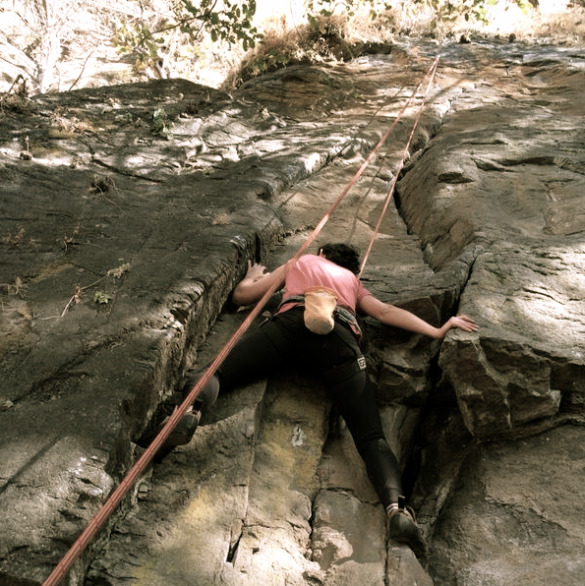
5 things I’ve learned while climbing
Fear is one of those things we all have to deal with, and heights is not a thing I will play stupid with, but when I think about it, I don’t think I’m afraid of heights. I’m most likely afraid to fall. For example, you cannot get me to climb a ladder. Anxiety plays in. Legs begin to tremble. Panic is so hard that paralizes me and then I cannot move. I can’t climb up or get down. More anxiety plays in. Repeat. If you fear falling down, perhaps you can relate to these symptoms. Not funny at all but I think it’s less funnier to be afraid of things you know you can change.
Then again, what is fear but a stop sign on the road to prevent you from going further?
When a friend from the office invited me to go and climb with her one saturday, I was kind of afraid, then saw my right arm tattoo that says “fearless” and I said “Why not? Break the cycle. Face your fears.”
So, there I was one saturday morning, waking up at 6 a.m. with people I’ve never seen before, secretly regretting going out on a chilly morning instead of being on my warm bed, quietly sleeping. There I was walking and climbing a mountain to find climbing spots. There I was getting dirty and feeling my burning lungs. There I was in the end, learning more about life than about climbing and here I’d like to share my thoughts and impressions:
1. Little steps get you to the top.
I’m a “fast-lane” addict, I work in advertising where everything is for “yesterday”. You want to make big, fast steps to get things done quickly, missing lots of important details in the end.
What I’ve learned while climbing is that every step, big or small, do count. One mistake we rookies make is trying to reach the bigger cracks because you think it will be safer, but rarely happens that way. In the end, you end up making more effort, wasting more energy, getting on to difficult spots, and most of the times you have to return to the previous position because that was not the smartest move.
When you are patient, when you stop to actually “feel” the wall, you realize there are lots of tiny-almost-invisible cracks right at your fingertips to help you advance. Small cracks are more abundant (depending on the wall) and used in “strategic” ways, they can save you lots of energy and get to the top quicker.
Exactly the same happens with life: most of the times you focus on the big stuff, the “whole picture” but life is more than big pictures and fast lanes. Life is about details, tiny things that make every day great: tiny moments of happiness, tiny accomplishments, tiny help from friends. Those tiny steps can get you to the top as well, and makes the process more enjoyable.
2. Technique might* be more important than strength.
I’m a total passive person and to make things worst, I smoke a lot. My weekends are about 20 hours in bed sleeping and eating, and sleeping back again, so I’m not in the best physical condition.
Even though climbing requires lots of training and strength, I’ve learned that technique and knowing how to use and move your body might be more important than being tall, having strong muscles and strong arms. Of course a strong body will make things easier and will avoid damage, but as in life, instead of making things happen by force, use your brain and learn techniques to get results in a better, smart and painless way.
*Disclaimer. I’m not a pro, so that’s why I use the word might, because I know there is more to it than just technique vs. strenght.
3. Invest in Gear.
I don’t know exactly the moment when it happens, but there comes a point in life when you just get used to the mediocre. You get used to “good” instead of “great”. When they ask you “How was your weekend?” you say “Good”. “How was vacation?” “Good”. “How is your job”, again “Good”. Very few people actually reply “Great. Fantastic. Amazing.” and I think it’s because we learned to make excuses of ourselves. We excuse on time, on resources, on politics, on family… on anything.
However, what I’ve learned while climbing is that when you “feel” your life is at stakes, you cannot be satisfied with “good”. You want things to be great, to be the best.
When you feel your life is in the equation (and it always is) you want a great gear that will play in your favor, because a great gear will facilitate things, a great gear will protect you. I know the shoes will not take me to the top, but they will protect my body. The ropes will not make me go faster, but they will secure my life.
Gear is essential to anything you do: from living to working to playing and having fun; so always try and go for the best. Think, research, compare, and if getting the best gear means additional investment, do it. You will feel the results in the long run.
4. Trust your team.
As everything in life, climbing is all about perspective.
When you are a rookie, it’s hard to see what a pro sees in a wall. While you see nothing but a plain rock, they see hundreds of cracks to climb. While you see a tiny crack, they see a huge one. While you get tired, they tell you to change hands, change feet or even will tell you how to lay on the rock to save energy. While you think you cannot do it anymore and you want down, they will cheer you up and seek for different routes to teach you and help you get to the top. (They will also find a great perspective to take pictures so you can brag about your climbing.)
One thing I’ve learned is that trusting your team’s perspective can be more important than trusting your own. Sometimes, instructions might sound weird and unreasonable, but you have to let go, trust and do without hesitation, because at that moment, everybody wants the same as you: get to the top.
Most important than perspective, is your team. It’s hard to find the right team, because great teams are not found, they are made. So choose your people with great care and build trust with dedication. Remember: trusting is like breathing. If you don’t do it, you die.
5. Getting to the top is not *that* important.
You know that saying that the road is more important than the destination, but once again, as cliche as it might be, it is true.
Living on the fast lane, you get used to the “achievement” mindset, you become a dopamine addict, you want results, the system wants results, and results feel good… until they do not. Until you forget to have fun and really enjoy the process.
The first wall I climbed I got so scared that I “fell” and got bruised because of my eagerness to do it right and perform. The frustration of not being able to get to the top hurt more that the bruises. Dopamine addict. I forgot to have fun.
What I learned was that it’s not about making it right or wrong, it’s not about getting to the top what matters the most. It’s not about getting that big fat paycheck at the end of the month, or getting that promotion in spite of losing your team, family and friends. It’s about having fun. Life is a game, a journey, whatever you want to call it, but in the end it will mean nothing if you forget to have fun. Remember to a child again. Play. Enjoy. Have fun.
Despite my suspicions, I know climbing is a very safe and fun sport to do. Even though I’m not willing to become an expert I love doing it because it becomes a form of meditation and it helps me find new insights into my life.
If you climb, I would love to hear your impressions, insights, techniques and tips as well.
(via 5 things I’ve learned while climbing | Happy Human Company)


You must be logged in to post a comment.